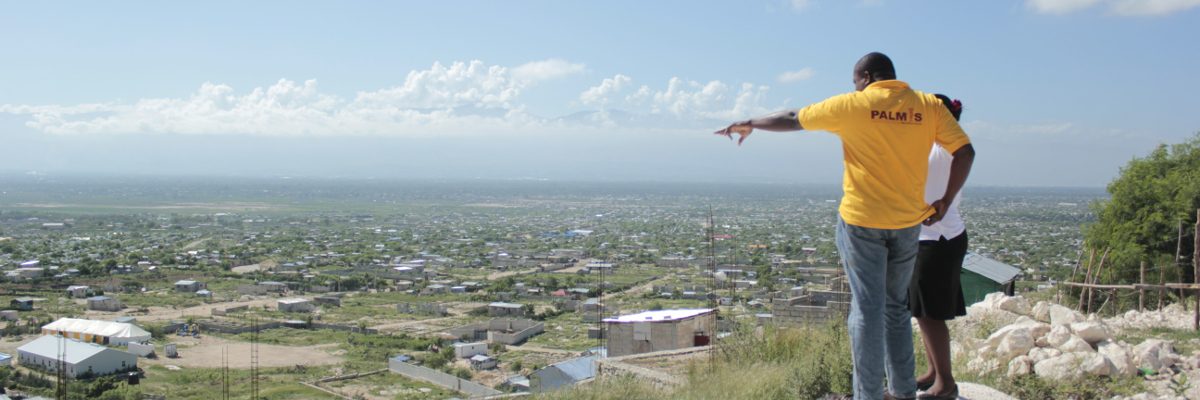5 years after the earthquake, let’s look at the progress we’ve made!
In January 2015, on the earthquake’s fifth anniversary, you might well hear the usual chorus “Nothing’s moving, nothing’s working, in Haiti as elsewhere”.
Those wanting to highlight the Haitians’ many accomplishments will be few and far between.
Flying in the face of such gloomy discourse, we want to share all our achievements with enterprising Haitian people, and all thanks to your generous support.
Supporting 23,000 micro-entrepreneurs
17,000 solar-powered lights and fuel-efficient stoves sold
Supporting 23,000 micro-entrepreneurs
Every day, we meet dozens of determined Haitians like Eltha (see inset) at meetings and on home visits.
When the earthquake first hit, we had already been assisting for seven years our local partner PALMIS Mikwofinans Sosyal* in developing services adapted to the needs of the poorest entrepreneurs.
In the aftermath of the earthquake, we were… like everyone else… totally transfixed… Then, we reacted… like all those saleswomen, street food vendors and craftspeople who just wanted to bounce back, yet urgently needed a helping hand. We met each of the 5,000 micro-entrepreneurs we were supporting to assess their situation. Which ones had lost a family member? Who needed medical care? Whose business assets had been spared and who had lost everything?
For some, we cancelled or rescheduled their loans, while others were granted an emergency loan. Throughout 2010, microloans were also granted to 3,000 new families. To complement this financial support, we developed our training courses as well as our health prevention programmes, especially during the cholera epidemic. Psychological support was provided to 2,925 people who had been traumatised by the earthquake (micro-entrepreneurs or their relatives). Furthermore, we cooperated with responsible social organisations, to which we referred some of our beneficiaries to help them resolve health, accommodation and education issues, among others. Lastly, we started up in 2011 a specific financing and support programme for VSBs (Very Small Businesses) now known as Say Yes! to Business.
* PALMIS Mikwofinans Sosyal: the new name of ID Microfinance
| 23,211 micro-entrepreneurs supported |
199 VSBs created and supported |
87% are women |
= | 116,000 people have gained greater independence |
2015, 5,000 new families
Through PALMIS Mikwofinans Sosyal, we also intend to support rural micro-entrepreneurs, to help them build their business in situ and therefore reduce migration to the capital. We have recently opened an agency in Hinche (Central Plateau) and are now looking into the possibility of opening another office in Saint-Marc or Mirebalais (100 km and 60 km north of Port-au-Prince respectively).
Through Say Yes! to Business, we will be strengthening our support to VSBs in Port-au-Prince and its surrounding areas.
17,000 solar-powered lights and fuel-efficient stoves sold
In Haiti, less than one in ten people have access to a modern energy source such as gas or electricity. Everybody compensates according to their means. The richest people have a generator. The poorest people allocate up to one fourth of their budget to candles, dangerous kerosene lamps, flashlights with expensive batteries and wood or charcoal cookstoves which contribute to the destruction of forestland that has already been reduced to 2% of the territory. According to the WHO, the harmful smoke produced by these traditional energy sources kill as many people each year as malaria and AIDS combined.
Since 2010, we have decided to take action in order to bring together:
- Families severely affected by the lack of access to energy sources,
- Sellerss wishing to earn a living by selling useful products,
- Suppliers offering affordable and good quality energy solutions.
We started by conducting market research analysis in order to efficiently target peoples’ needs. Then, we chose the products that matched those needs with the best price/quality/efficiency relationship: solar powered lights, gas stoves, and wood and charcoal cookstoves which consume less wood and generate less smoke. Following this, we created the PALMIS ENEJi social enterprise and organised a reliable distribution channel based on micro franchised sellers: we select them, train them, and help them assemble and renew their stock. We give them posters, leaflets and we organise commercial events so that their neighbours know they can buy these products, thanks to an energy credit offered by PALMIS Mikwofinans Sosyal.
This economic model allows for a rapid, strong and long-lasting impact on the poorest peoples budget, their living conditions, their health and their environment (10,000 less tones of C02 and 10,000 tons of wood spared in 2013). PALMIS Enèji, which will become an official Haitian social enterprise as of 1st January next year, just received the RIYA 2014 prize for the impact of its actions on environmental protection.
| 70 sellers generating an income |
17,000 solar-powered lights and stoves sold |
= | 66,000 people make savings, reduce their wood consumption and inhale less harmful smoke |
2015, 8,000 products sold, 100 sellers
Launch of new solar kits that provide light and run small electrical appliances (radio, fans, electric cooler, etc.)
Earthquake resistant housing
We trained 64 artisans in transforming the debris from the quake into construction materials. We also developed an earthquake resistant and cyclone resistant construction model with CRAterre. Then, we taught 60 bricklayers and carpenters to how to construct the model.
With us, these artisans have already built about twenty buildings, using mostly debris from the quake. We helped them to join the @ProCom association in order to support them in the development of their business and the diffusion of their knowledge.
| 124 artisans trained in the construction of earthquake resistant housing and debris recycling |
21 buildings and houses |
= | Job creation diffusion of knowledge on how to build buildings that protect the population |
2015
We are currently training ‘our’ artisans on the construction sites of a school and a community centre. Then, we will tackle an order for20-individual houses for very impoverished families with them. We will continue to strongly promote this type of cyclone resistant housing so that a maximum of families can gain access to them.

